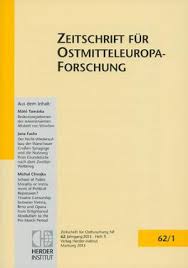„bu sulh u salah mukarrer ve mü’ebbed“ / „Pax perpetua“. Polnisch-litauische Friedensformeln und Allianzen mit Osmanen und Krimtataren bis 1790
Polish-Lithuanian Peace Formulas and Alliances with the Ottomans and Crimean Tatars to 1790
Author(s): Stefan RohdewaldSubject(s): Diplomatic history, Political history, 18th Century, The Ottoman Empire, Peace and Conflict Studies
Published by: Verlag Herder-Institut
Keywords: Poland; Ottoman Empire; Crimean Khanate; Diplomatic Relations; Shared History; Peace Treaties; Russia; Transilvania;
Summary/Abstract: This paper examines the political relations between Poland-Lithuania, the Ottoman Empire and the Crimean Khanate—taking into account France and the Habsburg Empire as other actors—to demonstrate how a pan-European context of war, equilibrium and security policy can be understood as a transnational network. The focus on PolandLithuania makes it clear that a pan-European understanding of Austro-Ottoman relations— all too often presented as pars pro toto for the entire Ottoman-European relationship— requires an appropriate consideration of eastern Europe. On the one hand, focusing on Poland-Lithuania and the Crimean Khanate places the conflict between the Ottoman Empire and Vienna in a broader context. On the other, this also explains how in 1790, with the benefit of hindsight, Mehmed Raşid, the person responsible for Ottoman external relations, was able to state that ‘the Poles are our oldest and best friends’. Ultimately the common procedures and explicit constructions developed as part of the communications process addressed cultural (in)difference. An assessment of the respective communication partner is fundamental to such an approach: Both Poland-Lithuania and the Ottoman Empire—as well as the dominions between these two states—were linguistically and religiously very heterogeneous. They were characterized as multi-ethnic empires that were founded on the practices of transgresssing (trans)cultural and ethno-confessional boundaries, without assuming that this precluded conflict or required an anachronistic and allegedly principled tolerance. This article traces such practices between the empires, in particular in the sphere of peace treaties. It shows that researchers need to modify the view that the Ottoman Empire did not enter into an explicitly perpetual peace with a Christian power until the 18th century, as the case of Poland demonstrates. The case of the Crimean Khanate also clarifies that it was not at all unthinkable in the repertoire of Ottoman foreign policy, including that of the Ottoman vassal, to enter into perpetual peace with Christian powers. Obviously, however, this strategy was not specifically applied in the Austrian context, but was very much used elsewhere in other Ottoman-European relations. Rather than an ideological ‘aversion’ to perpetual peace with Christians on the part of Ottoman dignitaries, it is more appropriate to call this a deliberately chosen strategy of taking different approaches to the respective partners in the European balance of power.
Journal: Zeitschrift für Ostmitteleuropa-Forschung
- Issue Year: 65/2016
- Issue No: 2
- Page Range: 167-192
- Page Count: 26
- Language: German

